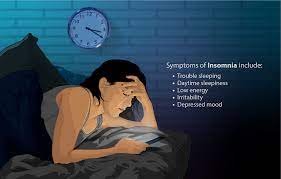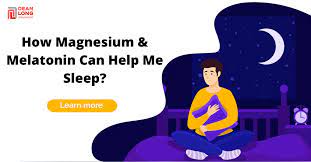Table of Contents

What Is Insomnia?
A person who experiences insomnia has trouble falling asleep or staying asleep.
It may result in daytime fatigue, irritability, and difficulty concentrating.
Many variables, including stress, worry, depression, drugs, and lifestyle choices, can contribute to insomnia.
How do u know if u have insomnia?
You may have insomnia if you have trouble going to sleep, remaining asleep, or getting up early and experience daytime fatigue, irritability, or inability to focus. Also, it is advised that you get medical help to find out if you have insomnia if you have these symptoms more than three evenings a week for at least three months.
What are the dangers of insomnia?
Many risks that have an impact on a person’s physical and mental health might result from insomnia. The following are some of the risks of insomnia:
- Increased risk of accidents: Insomnia can cause daytime exhaustion and sleepiness, which raises the danger of accidents when operating heavy machinery or driving a car.
- Mental health problems: Conditions like despair, anxiety and mood swings can be brought on by or made worse by insomnia.
- Weakening of the immune system: Sleep deprivation impairs immunity, making it more difficult for the body to fend off infections and illnesses.
- Long-term health issues: Those who experience chronic insomnia are at a higher risk of having long-term health issues such as high blood pressure, diabetes, and cardiovascular disease.
- Lower quality of life: Because insomnia drains a person’s vitality, productivity, and capacity for everyday tasks, it can lower a person’s quality of life.
How many hours of sleep is insomnia?
There is no set amount of sleep that defines insomnia. Having trouble falling asleep, remaining asleep, or waking up too early and not being able to fall back asleep despite having the chance to do so are all symptoms of this sleep disorder.
Depending on their age, lifestyle, and unique needs, people can have different sleep needs. But for most individuals, getting 7-9 hours of sleep per night is necessary to function normally during the day. Insomnia may be present if a person habitually receives less sleep than they require or has trouble falling or staying asleep for a lengthy amount of time.
How long will insomnia last?
Depending on the origin and seriousness of the sleep disturbance, the length of insomnia can vary. While insomnia can occasionally be short-lived and last only a few days or weeks, it can also develop into a chronic condition and endure for several months or even years.
Short-term insomnia is typically brought on by transient circumstances like stress, travel, or illness, and it may frequently be treated with minor lifestyle adjustments or by attending to the underlying cause. On the other side, chronic insomnia may need more extensive management techniques, like therapy or medication.
Who is most at risk for insomnia?
Anybody can experience insomnia at any age, but specific circumstances can make someone more likely to develop a sleep problem.
People in the following categories are more likely to experience insomnia:
- Older adults: As people age, their sleep patterns may change, which can cause insomnia.
- Women: Women are more likely to experience insomnia because to hormonal changes that occur during menstruation, pregnancy, and menopause.
- Insomnia is frequently linked to mental health issues such depression, anxiety, and post-traumatic stress disorder in people with these conditions (PTSD).
- Individuals who experience chronic pain: Chronic pain can interfere with sleep cycles and result in insomnia.
- Those with particular lifestyle habits: Smoking, drinking alcohol, and not exercising enough can all raise the chance of developing insomnia.
- Shift workers: Those who work rotational or night shifts may have trouble sleeping and are more likely to develop insomnia.
What are the types of Insomnia?
There are two main types of insomnia:
- Primary insomnia: This kind of insomnia has no underlying medical or psychological cause. Lifestyle elements including erratic sleeping patterns, stress, or poor sleep hygiene are frequently to blame.
- Secondary insomnia: This kind of sleeplessness is brought on by a primary medical or mental health issue, such as anxiety, sadness, persistent pain, or sleep apnea. Medication side effects, caffeine use, or alcohol intake can all contribute to secondary insomnia.
Insomnia can also be classified based on its duration:
- Acute insomnia: This type of insomnia lasts only a few days to a few weeks and is short-lived. It frequently results from a transient circumstance, such jet lag or a stressful incident.
- Chronic insomnia: This kind of insomnia lasts for three months or more and affects at least three evenings each week. It frequently results from an underlying medical or mental health condition and can significantly lower a person’s quality of life.

What are Insomnia symptoms?
The symptoms of insomnia can vary depending on the type and severity of the sleep disorder. However, common symptoms of insomnia include:
- Trouble falling asleep: Even though one is exhausted, it may take some time to do so.
- Trouble sleeping: A person may regularly wake up at night and struggle to fall back asleep.
- Getting up too early: A person could find it difficult to fall back asleep after waking up sooner than planned.
- Daytime somnolence: A person may have fatigue and difficulties focusing during the day.
- Irritability and mood swings: Lack of sleep can alter a person’s mood, making them angrier or tenser.
- Fatigue: Even after a full night of sleep, a person may still feel mentally and physically exhausted.
- Impairment of performance: Insomnia can make it difficult for someone to complete activities at work or school.
- Headaches: Some insomniacs may develop headaches as a result of their sleep deprivation.
If these symptoms persist for several days or weeks, it may indicate the development of insomnia. It is important to seek medical advice if you are experiencing these symptoms to determine the underlying cause and develop an appropriate treatment plan.
What part of the body does insomnia affect?
A person’s physical and mental health may be significantly impacted by insomnia, which can have an impact on many different regions of the body.
- Brain: Insomnia can impair brain function, which can make it harder to perform cognitive functions like memory, concentration, and decision-making.
- Heart: Sleep deprivation can raise your chance of developing heart disease, stroke, and high blood pressure.
- Immune system: Insomnia can impair immunity, leaving a person more vulnerable to infections and diseases.
- Digestive system: Acid reflux, indigestion, and nausea are just a few of the symptoms that can result from insomnia when the digestive system is upset.
- Endocrine system: Sleep deprivation can throw off the body’s hormonal balance, which can have an impact on metabolism, hunger, and weight gain.
- Muscles and joints: Insomnia can lead to joint pain and weariness, which can make it challenging to carry out daily tasks.
- Mental health: Insomnia can increase the symptoms of various mental health illnesses and is frequently linked to mental health issues including sadness and anxiety.
Overall, insomnia can have a serious influence on one’s physical and mental health, emphasizing how important getting enough good sleep is.

Causes for Insomnia.
Many variables that can interfere with the regular cycle of sleep and wakefulness can contribute to insomnia. Insomnia has a number of common causes, including:
- Stress and anxiety: Anxiety and worries can keep a person’s thoughts occupied and prevent them from unwinding and sleeping.
- Bad sleep habits: The normal cycle of sleep and wakefulness can be upset by irregular sleep patterns, daytime naps, and excessive caffeine or alcohol consumption.
- Medical conditions: Sleep apnea, asthma, gastrointestinal problems, and chronic pain are just a few of the ailments that can cause insomnia.
- Drugs: As a side effect, some drugs, including antidepressants, steroids, and blood pressure medications, can cause sleeplessness.
- Ambient factors: It might be challenging to get to sleep and stay asleep due to noise, light, and uncomfortable sleeping conditions.
- Hormone changes: Women may experience insomnia as a result of hormonal changes related to the menstrual cycle, pregnancy, and menopause.
- Growing older: Changes in sleep habits can make insomnia more likely.
- Psychological factors: Post-traumatic stress disorder (PTSD), anxiety, and depression are among the mental health conditions that can lead to insomnia.
What is the main cause of insomnia?
Many factors can contribute to insomnia, which might differ from person to person. The circumstances, way of life, and underlying medical issues of the person might all play a role in the primary cause of insomnia.
To be sure, among the most typical reasons of sleeplessness are stress and anxiety. An individual’s worries and concerns can keep their mind occupied and prevent them from unwinding and sleeping. Poor sleep patterns, medical illnesses, drugs, environmental variables, hormonal changes, ageing, and psychological issues are some more prevalent reasons of insomnia.
For the purpose of creating an effective treatment strategy, it is crucial to determine the underlying causes of insomnia. In other instances, improving sleep may only need treating an underlying medical condition or taking care of lifestyle issues like stress management and sleep hygiene. In other situations, a physician might suggest drugs or therapy to treat sleeplessness.
What foods cause insomnia?
Some meals and drinks, especially when ingested just before night, might disrupt sleep and cause insomnia. These are a few instances:
- Caffeine: Caffeinated beverages including soda, coffee, and tea can make it difficult to fall asleep and remain asleep.
- Alcohol: Although it may initially make you feel tired, alcohol can interfere with sleep later in the night and cause you to wake up in the middle of the night.
- Foods that are spicy and greasy can make it hard to fall asleep since they can give you indigestion and heartburn.
- Sugary foods: Consuming sugary foods right before bed might result in blood sugar spikes and crashes, which can interfere with sleep.
- High-protein foods: Eating high-protein foods right before bed can upset your stomach and keep you up at night.
- Heavy meals: Eating large meals right before bedtime might make you feel sick and give you indigestion, which makes it hard to sleep.
For several hours prior to bedtime, it is advised to refrain from consuming certain kinds of meals and beverages in order to increase the quality of your sleep. If necessary, try to replace it with a modest, wholesome snack like a piece of fruit or some whole-grain crackers and peanut butter.
What causes insomnia in females?
Many factors, such as the following, can contribute to female insomnia, including:
- Hormone alterations: Women go through hormonal alterations during their menstrual cycle, pregnancy, and menopause, which can interfere with their sleep cycles and cause insomnia.
- Pregnancy: Changes in hormone levels, physical discomfort, and frequent urination during pregnancy can all interfere with sleep.
- Menopause: Hot flashes, night sweats, and other menopausal symptoms can make it difficult to fall asleep.
- Stress and anxiety: Because women frequently balance a variety of obligations, including work, family, and housework, this can result in stress and worry that interferes with sleep.
- Medical conditions: Women may experience insomnia as a result of illnesses like depression, fibromyalgia, and chronic pain.
- Medications: As a side effect, some drugs frequently prescribed to women, like antidepressants and hormone replacement therapy, can cause insomnia.
- Lifestyle factors: Bad sleep habits, including inconsistent sleep cycles, daytime naps, and excessive caffeine or alcohol use, can interfere with the natural cycle of sleep and wakefulness.
Women who experience the signs of sleeplessness should consult a doctor to determine the underlying cause and create an effective treatment strategy.
Treatment for Insomnia.
The underlying cause and the severity of the symptoms can influence the course of treatment for insomnia. Following are some typical medical options:
- Lifestyle adjustments: Altering everyday activities and sleeping patterns can enhance the quality of your sleep. Creating a comfortable sleep environment, making a soothing bedtime routine, avoiding stimulating activities right before bed, and having a regular sleep schedule are a few examples of how to do this.
- Cognitive-behavioral therapy (CBT): CBT is a form of talk therapy that can support the modification of unfavorable sleep-related attitudes and behaviors. By assisting people in developing relaxation and stress-reduction practices, it can be helpful in treating insomnia.
- Drugs: A doctor may give sleep aids like hypnotics and sedatives to help you sleep better. Nonetheless, they are frequently advised for short-term usage, and they could have negative side effects.
- Fixing underlying health issues: Treating underlying health issues, such as sleep apnea or persistent pain, might enhance sleep quality.
- Alternative therapies: Acupuncture, herbal supplements, and mindfulness meditation are a few examples of alternative therapies that some people find to be beneficial for enhancing sleep.
Although putting these strategies into practice may take some time and effort, they can be successful in enhancing sleep quality and sustaining long-term improvements. Along with a healthcare professional, it’s critical to pinpoint the root cause of insomnia and create a customized treatment plan that meets each patient’s needs and preferences.
How do I cure my insomnia?
Although it may not always be feasible to entirely cure insomnia, the correct management strategy can help. These are some actions you can take to have a better night’s sleep:
- Create a consistent sleep schedule: Even on weekends, go to bed and wake up at the same times every day.
- Establish a soothing nighttime routine: Do calming things before bed, like reading or having a warm bath, to let your body know that it’s time to sleep.
- Create a comfortable sleeping environment: Use soft cushions and blankets in a calm, cool, and dark bedroom.
- Limit caffeine and alcohol consumption: These two substances shouldn’t be consumed right before bed because they can interfere with rest.
- Exercise frequently: Make time for regular exercise, but steer clear of strenuous activity right before night.
- Put stress management skills into action: To ease tension and encourage relaxation, learn relaxation techniques like deep breathing, progressive muscle relaxation, and mindfulness meditation.
- Take into account cognitive-behavioral treatment (CBT), a form of talk therapy that can assist in changing unfavorable beliefs and sleeping-related behaviors
- .Speak with a healthcare professional: If lifestyle modifications and cognitive behavioral therapy (CBT) do not help your symptoms, speak with a healthcare professional who may prescribe medication or suggest alternative treatment choices.
What can I drink or eat to sleep faster?
There are a number of drinks that might encourage relaxation and hasten your ability to sleep. These are a few instances:
- Warm milk: Milk includes tryptophan, an amino acid that facilitates serotonin production, which controls sleep.
- Herbal tea: Popular for their relaxing effects, chamomile, valerian root, and passionflower tea can all aid in relaxation.
- Tart cherry juice: Melatonin, a hormone that controls sleep, is present in tart cherry juice and may aid to induce tiredness.
- Warm water with honey can aid with tryptophan production, which encourages tiredness and relaxation.
- Bananas: The amino acid tryptophan, which is present in bananas, aids in the creation of serotonin, a neurotransmitter that controls sleep.
- Almonds are a good source of magnesium, which can aid in promoting relaxation and enhancing the quality of sleep.
Disclaimer:
It’s important to note that while certain foods and drinks can promote relaxation and improve sleep quality, they should be consumed as part of a balanced diet and not relied on as the only method to address insomnia. It’s always best to consult with a healthcare provider to identify the underlying cause of insomnia and develop an appropriate treatment plan.